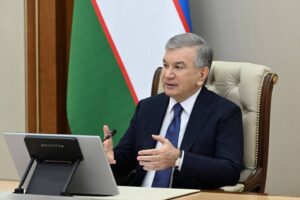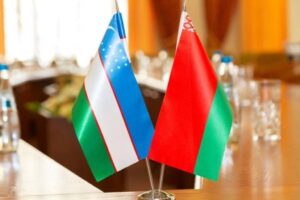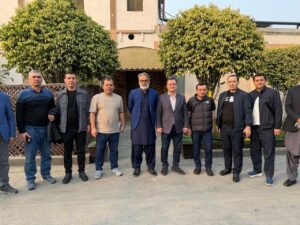President Mirziyoyev Chairs Meeting to Boost Regional Tourism and Foreign Investment Initiatives

Tashkent, The Gulf Observer: President of the Republic of Uzbekistan Shavkat Mirziyoyev chaired a video conference meeting on April 9, focusing on enhancing the regional tourism potential and expediting projects involving foreign investment. The session brought together ministers, regional leaders, foreign ambassadors, and key stakeholders from the tourism sector.
In recent years, Uzbekistan has witnessed notable growth in tourism. The export of tourism services has surged by 1.6 times, reaching $3.5 billion. Over 2,000 new entrepreneurs have entered the sector, and in a historic milestone, more than 10 million foreign tourists visited the country in the past year alone.
The government has made significant strides in tourism infrastructure development. Over the past eight years, $6.5 billion has been invested in the sector, creating 130,000 hotel beds nationwide. Presently, 20 tourist villages are operational, and an international ski resort is under construction at Oltin Bel Peak in Parkent district.
While Uzbekistan’s historical, cultural, and natural assets offer vast potential to increase tourist arrivals by two to three times, President Mirziyoyev noted that certain regions still face challenges. These include inadequate road infrastructure, limited transportation links, a shortage of entertainment venues, and underdeveloped tourist programs.
To address these gaps, the meeting discussed comprehensive measures to unlock local potential, expand tourist destinations, and improve visitor services. Notable opportunities were highlighted, such as winter tourism prospects in Sariasiya district, where $200 million in projects—including cable cars, hotels, and commercial facilities—could be developed. Chartak district was also recognized for its scenic beauty and healing springs.
The President instructed responsible officials to draft a targeted development program for 36 districts and cities, emphasizing diverse tourism segments such as ethnic, gastronomic, medical, extreme, cultural-historical, pilgrimage, winter, and agrotourism.
Efforts are underway to promote Uzbekistan’s image globally through international media outlets like BBC and Euronews, as well as participation in over 20 international exhibitions. Simplified visa procedures and the procurement of modern aircraft are further enhancing accessibility.
The Head of State emphasized the need to capitalize on these opportunities to attract tourists from promising markets. He also ordered the establishment of direct international flights and the rapid implementation of a National Unified Tourism Platform. This digital platform will integrate e-visa issuance, ticket purchases, and the launch of a unified tourist card granting access to all historical sites.
Domestically, tourism continues to grow, with 23 million local travelers recorded last year. To further promote internal tourism, one weekend each month will now be designated as “Family and Team Travel Days,” while youth competition winners under the “Travel around Uzbekistan” initiative will receive travel vouchers.
The preservation and restoration of cultural heritage remain a key priority. In the past four years, conservation efforts were completed at 327 sites, while 485 additional complexes await restoration. President Mirziyoyev underscored the importance of involving the private sector in these initiatives, improving lease mechanisms, and digitizing the tracking of cultural heritage revenues.
In the sphere of tourism education, the duration of higher education has been reduced to three years, and a dual education system has been introduced. Plans are also in place to facilitate overseas internships and job placements for tourism students. These comprehensive reforms aim to attract 15 million tourists annually and increase tourism service exports to $4 billion.
Foreign Investment Strategy and Project Implementation
The second agenda item centered on analyzing foreign investment projects. In the first quarter of 2025 alone, high-level visits to countries such as the UAE, Malaysia, Kuwait, and France resulted in 178 agreements totaling $39 billion. At the Samarkand summit, the European Union pledged €12 billion in financial support for Central Asia.
Uzbekistan aims to attract $42 billion in foreign investment by 2025. This includes 81 major projects, over 8,000 medium- and small-scale ventures, $2 billion in grants from donor organizations, and $6 billion through banking channels. A regional and partner-based analysis of investment potential was presented at the meeting.
In traditionally underdeveloped areas such as Oltinsoy district, three projects totaling $100 million are in progress despite the lack of rail and highway infrastructure. Similarly, granite mining projects worth $75 million have begun in Kushrabat district. These examples demonstrate that with strategic planning, every region can become an investment hub.
Following the successful Uzbekistan Investors Day in London, which secured $2.77 billion in investment commitments, the President instructed officials to organize similar events in global financial centers including New York, Singapore, Hong Kong, Dubai, Shanghai, Tokyo, and Istanbul.
As part of an ambitious privatization drive, Uzbekistan will offer shares in 49 state-owned enterprises on international markets and issue Eurobonds through 15 major state-owned companies. Upcoming investment forums in Jizzakh (April) and Tashkent (June) will serve as key platforms to present thoroughly prepared investment packages.
The President highlighted recent progress made in cooperation with international financial institutions, resulting in $706 million in funding since the beginning of the year for energy, infrastructure, and agriculture projects.
However, concerns were raised regarding delays and inefficiencies in some project implementations. To address this, the President mandated that all amendments to finalized projects must receive government approval and additional work should only begin after the completion of primary phases using surplus funds.
Currently, projects valued at $20 billion are being executed with the support of global institutions in critical sectors such as energy, transport, agriculture, utilities, and social development. International partners, including the World Bank, the EBRD, the Asian Development Bank, the French Development Agency, and the Islamic Development Bank, have collectively pledged $1.5 billion for projects in the regions.
The Deputy Prime Minister was directed to replicate this model across other regions and ensure the development of projects worth at least $3 billion.
The meeting concluded with the presentation of proposals by ministers, regional governors, ambassadors, and tourism entrepreneurs, reaffirming Uzbekistan’s commitment to becoming a dynamic and attractive destination for both tourists and investors alike.


